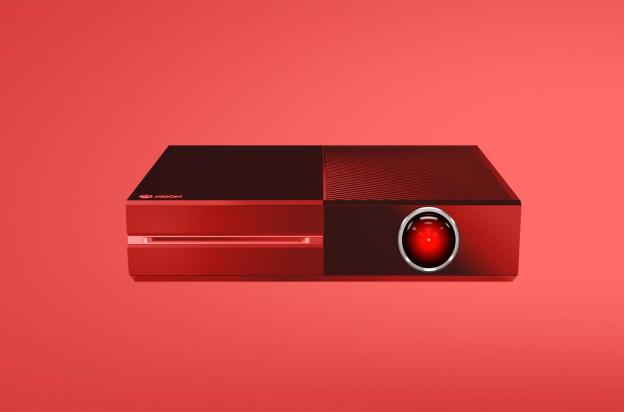
I swear it’s watching me, the latest model Kinect, with its unblinking 1080p eye, its microphones recording my every breath. It can see my heart beating in my face. It might even know what I’m thinking. I better not imagine anything incriminating, I think, my hand stuffed halfway down a can of Pringles.
Just then, four perplexing propellers pop out from the corners of Kinect’s sleek black body and buzz to life. I jump in my seat, spewing crumbs on the floor. Kinect lifts off from atop my flat screen to hover about five feet in the air, where it stays, whirring away.
I cough, stunned. A tiny red light on its face flickers on for a millisecond, a sure sign that Microsoft’s people are listening. I feel in my gut that I’m not alone.
“Honey, would you like some pasta?” my girlfriend asks from the kitchen.
“Creeping Jesus! Be quiet. Just be quiet,” I tell her, my voice dwindling to a whisper. “They’re. Watching. Us. They’ll know that you’re here. They’ll know we eat pasta.”
“But … what are you …”
“Quiet!” I say. “Don’t come in here. In fact, don’t move at all. Who knows what this thing is capable of?”
Slowly, carefully, I slide my body upright, taking deep, slow, even breaths. My heart begins to race just to spite me, and I wish I’d taken that yoga class more seriously. Damn, now that thing probably knows I did yoga. What about fear? Can this thing detect fear? Surely it can.
As I inch closer to the door, out of the Kinect drone’s view, my dog, asleep a moment ago, bounces to his feet, ready for action. His chain collar jingles, and the red light flickers on again.
I blurt out a hearty “NOOOO!” just in time to see a blue, fanned-out laser beam fire out of Kinect’s front. I leap on the dog, trying to protect him from its glare. The laser does a swift scan of the room, its red brain blinking madly.
Three thousand miles away, a Microsoft worker in a bright blue lab coat chuckles. He now knows every book I own, what couches I have, the ID number on my dog’s tag, and my preferred flavor of Pringles. “Excellent,” he says to himself. “The boss will be pleased.”
Problem is, I might be nuts – that thing they call people when their interpretation of the world fails to reflect reality.
Over the past two years, I have written hundreds of articles warning my fellow technology users about the perils of the privacy violations I see throughout our digital universe. Fear Facebook. Damn Google. Block the advertising cookies, and delete the apps. With each new product release, I envision a tired Orwellian existence in which our personal details are used to seduce us into doing things that boost bottom lines, pinpoint our actions, and scare us into submission – the Xbox One is merely the latest source of my fear. Install Adblock Plus and Ghostery. Subscribe to a VPN. Search with DuckDuckGo. If you were really smart, you’d only log on using Tor – yes, Tor. Don’t know what I’m talking about? Here, let me explain again.
This message of prudence and caution is, I believe, imperative. Refusing to blindly jump onto the latest product helps protect you from the nefarious Dr. Evils of Big Business and Big Government. It empowers you to take back control of the tidbits of your life that you shed every time you log on and check in. It returns at least a sliver of the privacy you lost along the way, and leaves you better fortified for a future in which They have the power to ruin your life thanks to the information you foolishly handed over in exchange for some shitty messaging app.
Problem is, I might be nuts – that thing they call people when their interpretation of the world fails to reflect reality. After all, almost none of us has experienced a single negative consequence as a result of the demon called data collection. And it’s entirely possible that few ever will.
When it comes to most of the scary Big Brother stuff, however, we have few instances on which to hang our tin foil hats.
Yes, there are instances in which the types of privacy practices I espouse are important. There are people whose lives have been upended because of the Web. People are fired from their jobs for saying something nasty about an employer on Facebook. Battered women are tracked down by violent spouses using people searches. Homes are robbed thanks to oversharing traffic apps. During the Boston Marathon Bombing, an innocent man was unjustly accused of murders he didn’t commit. And those who do commit crimes have found themselves behind bars for failing to employ even a modicum of privacy.
When it comes to most of the scary Big Brother stuff, however, we have few instances on which to hang our tinfoil hats. Most of the doomsday scenarios I’ve apprised over the years have failed to come true – so far, at least – and instead wallow in the purgatory of far-off hypotheticals. And it is for this reason, I believe, that most of you out there don’t worry about this stuff in the way I do. You don’t turn into a proselytizing crank after you watch a Microsoft press conference, or avoid a Facebook app simply because it wants to post on your behalf. You see fun, productivity, possibilities, while I see a new nightmare at every turn. I keep banging the drum; you keep ignoring me.
So tell me, which is it: Am I the crazy fool? Or are you?


